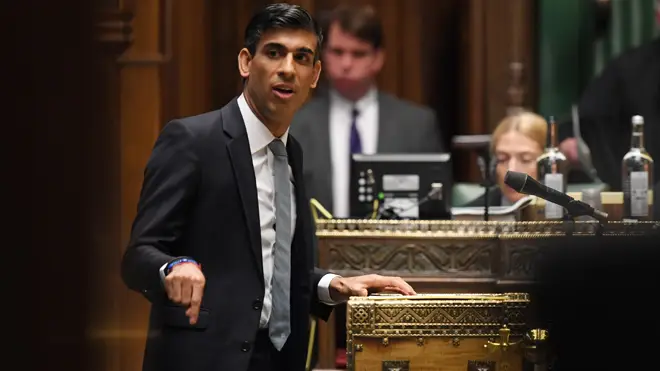
Shelagh Fogarty 1pm - 4pm
9 July 2020, 07:22 | Updated: 9 July 2020, 09:17

VAT to be cut to 5% for hospitality businesses
Rishi Sunak's summer statement will see the bill for tackling the coronavirus crisis rise to £190 billion, according to treasury figures.
The total was reached after Mr Sunak announced a package of measures yesterday aimed at helping the country bounce back after the crisis.
The Institute for Fiscal Studies (IFS) will give its verdict on Mr Sunak's spending promises during an online briefing on Thursday morning.

Key announcements included meal deals for those eating out in August and cash bonuses for businesses taking staff off furlough.
IFS director Paul Johnson has predicted that "more support may well need to be announced in the autumn" when more is known about the virus and the impact it has had on the UK economy.

Customers to get £10 off per head at participating restaurants
Speaking after Wednesday's summer economic statement, Mr Johnson said the action plan was "focused on the right things" but that its scale "in part reflects how hard it is to target resources only where they are really needed".
Mr Sunak's statement contained the potential for £30 billion of extra spending on top of almost £160 billion already committed to dealing with the coronavirus emergency - a figure far higher than previously estimated - and there is little indication of how the Treasury intends to pay for it.

Labour accuse Chancellor Sunak of putting off big decisions
The Chancellor, in what amounted to a mini-Budget, told MPs in the Commons that the Government will do "all we can" to keep people in work.
He announced that firms which have furloughed staff will be given a £1,000 bonus to keep workers in jobs, a move designed to help protect livelihoods after the economy contracted by 25% in just two months.
Mr Sunak's intervention comes after warnings from the Organisation for Economic Co-operation and Development (OECD) that the UK's unemployment rate could soar to 14.8%, with job losses comparable to the 1930s.
The Cabinet minister, who is due to visit a factory in the West Midlands on Thursday, said the jobs retention bonus could cost up to £9 billion if all furloughed workers are retained.
The Number 11 incumbent unveiled the measure as part of an emergency package of support to help keep people in work as the coronavirus economic crisis hits.
Unveiling announcements in a "plan for jobs", Mr Sunak also:
- Announced an "eat out to help out" plan for dining out in August to boost the hospitality sector, with a 50% discount per head from Monday to Wednesday up to a maximum discount of £10 per diner.
- Slashed VAT on food, accommodation and attractions from 20% to 5% from July 15 until January 12, a tax cut worth up to £4 billion.
- Confirmed plans to abolish stamp duty on properties up to £500,000 in England and Northern Ireland under a temporary measure lasting until March 31 2021.
- Set out a scheme for firms to be given £2,000 for each new apprentice they hire under the age of 25 and a new bonus of £1,500 for apprentices over that age.
Listen & subscribe: Global Player | Apple Podcasts | Google Podcasts | Spotify
The furlough scheme winds down in October, and Mr Sunak acted in an attempt to avoid widespread redundancies as state support is withdrawn.
Union chiefs criticised the decision not to extend furlough support, with Unite general secretary Len McCluskey saying: "Our fear is that the summer jobs loss tsunami we have been pleading with the Government to avoid will now surely only gather pace."
But Mr Sunak said: "While we can't protect every job, one of the most important things we can do to prevent unemployment is to get as many people as possible from furlough back to their jobs."
Under the Jobs Retention Bonus, firms will be paid £1,000 for each employee they bring back from furlough and continuously employ through to January on an average of at least £520 a month.
Prominent figures on the Tory benches raised concern at the scale of intervention involved.
Former minister Steve Baker MP said the measures were "quite expensive" while self-confessed Thatcherite Sir Edward Leigh MP said subsidised jobs were "sooner or later subject to fraud and market distortion".
Meanwhile Ed Balls, an ex-shadow chancellor, called Mr Sunak's recovery blueprint a "gamble".
Speaking on ITV's Peston programme, the former Labour Treasury minister said the job bonus scheme would only be enough "if the economy is strengthening".
He said: "If on the other hand the economy as we all expect will have a tough time for the next six months, then a thousand pounds, for lots of businesses, is going to be nowhere near enough to make the difference."
But Business Secretary Alok Sharma said the decision to stump up more state money was "absolutely the right thing to do".
"What I think very many people acknowledge is that the cost of inaction would have been much greater than the action that we've taken," he told Peston.
"You'll have heard this from the OBR (Office for Budget Responsibility), from the Bank of England, and I think it's absolutely the right thing to do - to protect the jobs so that we are able to bounce back as we go forward."
Labour shadow chancellor Anneliese Dodds welcomed the support for the economy but stressed that more needs to be done to control the virus.